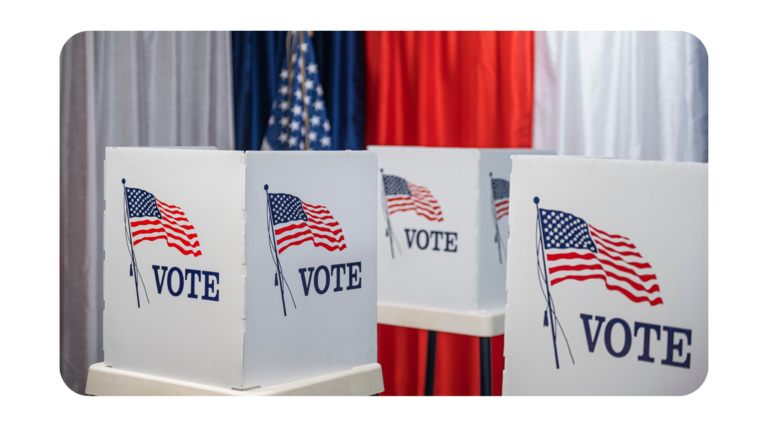
Supporting employees’ right to vote on Election Day shows that your company values both their participation in civic life and their role at work. A well-thought-out policy gives them the freedom to vote without stress, and helps your business maintain smooth operations.
The right policy also ensures that your team doesn’t have to choose between their civic duty and their work commitments. After all, voting is a way for individuals to make their voices heard, and your company can play a role in making that happen.





In many places, yes, but the rules vary depending on where you’re located. Some states in the U.S. have laws requiring employers to provide time off for voting, while others don’t, so it’s best to get familiar with local laws. For example, in California, employers are required to provide up to two hours of paid time off to vote if the employee doesn’t have enough time outside of work hours to cast their ballot.
Even if your state doesn’t mandate time off for voting, having a clear and thoughtful Election Day policy can greatly benefit your organization. For employees, having the peace of mind that they can take time to vote without work penalties can build trust and improve internal motivation within your team. If you want this for your organization but aren’t sure where to begin, our team of experts at Next Level Strategies can help you craft a policy.

The amount of time employees need to vote will depend on state laws, but generally, if an employee’s working hours overlap significantly with the time polls are open, they are entitled to time off, typically around two hours. However, companies might also want to consider more flexible options, like offering half-day leaves, or supporting early or absentee voting. This makes it easier for employees to participate without disrupting the workflow too much.
It’s worth noting that giving time off to vote doesn’t necessarily mean losing productivity. Believe it or not, studies show that employees who feel valued and supported by their employer are more productive and engaged overall. So, offering time off for voting could ultimately help create a happier, more loyal workforce!

As a federally protected class, employers must respect their employees’ political affiliation in the workplace. Today’s political climate is more charged than ever, and actively managing how political discussions are handled on the job is essential. While employees may feel inclined to express their views, it’s the employer’s responsibility to ensure these conversations don’t create discomfort or division.
When political discussions arise, employers should take swift action to neutralize them to maintain an inclusive, apolitical environment. For example, if a manager overhears political debates during work hours, they might step in and say, “Let’s keep our conversations focused on work to maintain a comfortable atmosphere for everyone.” This may take some getting used to, but it is critical for keeping the workplace free from political tension, discomfort, or alienation among your employees.
Take a look at your dress code policy to make sure it disallows the wearing of political garments or insignia at work and make sure you’re even-handed about the implementation of the policy. For instance, if someone wears a pro-candidate t-shirt or pin to work and it favors your preferred party, you might be tempted to overlook the policy violation.
Employers can support civic engagement without allowing partisan dialogue to dominate. By fostering this balance, companies can protect employees’ rights and create a more harmonious workplace where everyone feels respected and included.
In states where voting time off is mandated, employers cannot deny this time to employees. Even in states without such laws, it’s still good practice to allow employees flexibility on Election Day. Imagine telling someone they can’t go vote— it sends the wrong message about the company’s civic values.
Of course, operational challenges will arise, especially for businesses that need to remain open all day, like retail or customer service. With careful planning—staggering shifts, for example—these challenges can be managed. Companies can even offer perks like scheduling flexibility for employees who vote early or use absentee ballots. Have any questions about setting this up for your employees? Next Level Strategies is here to help.

Having a clear Election Day policy shows that your organization is serious about civic engagement. It positions your company as one that supports the democratic process, which can enhance your public reputation. More than that, it ensures that everyone is treated fairly.
If figuring out how to handle time off for voting is stressing you out, don’t sweat it—we’re here to simplify the process. Grab a free consultation with us, and we’ll help you craft an Election Day policy that keeps your team happy, compliant, and running like clockwork.
Reach out to our team of HR experts today!
An Election Day policy outlines a company’s guidelines for allowing employees time off to vote on Election Day.
Having a policy ensures that employees can exercise their right to vote without fear of losing pay or being penalized at work, thus encouraging social responsibility.
Businesses can encourage voting by providing paid time off, flexible work hours on Election Day, or by promoting civic engagement in company communications.